In Focus This Week
Cuyahoga County, Ohio launches voter education series
College interns play major role in program
By M. Mindy Moretti
electionline.org
The Cuyahoga County, Ohio Board of Elections (CCBOE) recently initiated an Election Integrity Series, a comprehensive 9-topic program  designed to educate and engage the community on various aspects of the election process. This series aims to enhance transparency, build trust, and ensure a well-informed electorate by delving into the mechanisms that uphold the integrity of elections.
designed to educate and engage the community on various aspects of the election process. This series aims to enhance transparency, build trust, and ensure a well-informed electorate by delving into the mechanisms that uphold the integrity of elections.
“The BOE recognizes the danger this misinformation poses to the democratic process, so it wants to reassure the public that elections are safe, secure, fair, and worthy of participation,” explained Lily Scherer, one of two college interns who worked on the program. “The hope is that this program educates members of the public and alleviates their concerns about the electoral process. The BOE wants to remind people it is the most trustworthy source of information about voting and elections.
The CCBOE has had a “Rumor Control Central” page on its website for two years, which served to address several election “myths” that are commonly believed. This election integrity series in a way is just expanding upon this effort, except the CCBOE is now actively pushing this effort outwardly to the public through the media (both traditional and social), 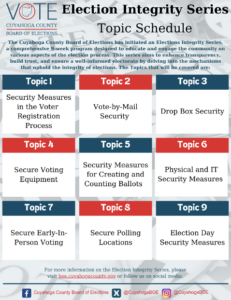 community events, public events at the CCBOE, and more.
community events, public events at the CCBOE, and more.
“This is our response to the concerns that we have heard from voters,” said Anthony Perlatti, director of the Board of Elections. “This campaign will reassure voters that our elections are transparent, fair and accurate.”
Videos and other resource materials will provide information that will teach people exactly how the Board of Elections’ systems and procedures ensure the integrity of our voting systems.
Each Election Integrity topic will be released on Facebook and available on X (formerly Twitter), Instagram and YouTube and the Board of Elections website. The Election Integrity materials and videos will remain on the Board of Elections website and social media platforms through the November 5, 2024 Presidential General Election.
Election Integrity topics:
1: Security Measures in the Voter Registration Process
2: Vote-by-Mail Ballot Security
3: Ballot Drop Box Security
4: Secure Voting Equipment
5: Security Measures for Creating and Counting Ballots which includes ballot hand count
6: Physical and Information Technology Security
7: Secure Early In-Person Voting
8: Secure Polling Locations
9: Election Day Security Measures
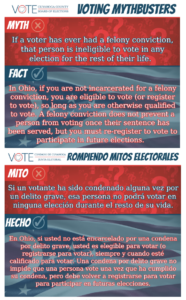 The release of each topic will be accompanied by videos elaborating on the importance and security implications of the topic. The videos will explain key messages in a digestible and engaging manner. In addition to the videos, the CCBOE will be releasing relevant flyers, infographics, and social media graphics related to the topics. While the Board hopes to reach everyone with this program, they do have a target audience as well.
The release of each topic will be accompanied by videos elaborating on the importance and security implications of the topic. The videos will explain key messages in a digestible and engaging manner. In addition to the videos, the CCBOE will be releasing relevant flyers, infographics, and social media graphics related to the topics. While the Board hopes to reach everyone with this program, they do have a target audience as well.
“However, we especially want to reach the groups most skeptical of the voting process and least likely to vote,” Sherer said. “This includes those who believe the results of the 2020 presidential election were fraudulent, voters 18-25, and voters over 65. We hope this series will reassure these voters about the validity of elections and the strength of our democracy.”
Additionally, through the summer the CCBOE is holding three major public events relating to the topics. There will be a sample hand-counting event, a panel discussion about election security with the directors of the Cuyahoga, Franklin, and Hamilton County Boards of Elections, and a warehouse walkthrough. The hand-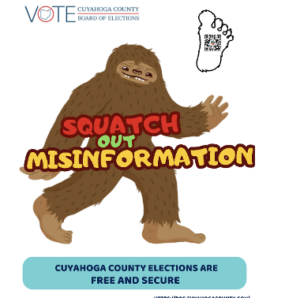 counting event will be in person, with the goal to prove the safety, efficiency, and efficacy of voting machines while highlighting the impossibility of a hand-counted election. The warehouse walkthrough will also be in person, but the panel will be pre-recorded and released on the website.
counting event will be in person, with the goal to prove the safety, efficiency, and efficacy of voting machines while highlighting the impossibility of a hand-counted election. The warehouse walkthrough will also be in person, but the panel will be pre-recorded and released on the website.
According to Peter James, CCBOE elections and compliance administrator, the Community Outreach Department has been a part of about 60 in-person events this summer. Either directly or indirectly, these events have served as another opportunity (outside of our social media reach and our website) to spread the word about the election integrity series. The feedback the Community Outreach Department has received from these events has been overwhelmingly positive.
“The analytics on both our social media posts and YouTube videos have been higher than what we typically see, particularly during the summer,” James said. “In particular, a video interview with our Deputy Director Tony Kaloger about our Ballot Drop Box has seen nearly 1,000 views in the first five days it was published.”
In addition to Scherer, a rising senior at George Washington University in Washington, DC, Athena Vadnal, a rising senior at Wesleyan University in Connecticut also worked on the program.
 “Working with the interns has been successful from both perspectives I believe,” said James. “From the board’s perspective, having two college students with design and video creation skills has allowed us to create content that we might otherwise not been able to do. More importantly, having interns dedicated exclusively to this project ensured it would get done, done well, and on time. There is simply too much preparation time needed ahead of the November election for regular staff to have created this series. From their standpoint, it provided them with experience working in an office setting while being able to create content (and generate references) that could be used for future employment.”
“Working with the interns has been successful from both perspectives I believe,” said James. “From the board’s perspective, having two college students with design and video creation skills has allowed us to create content that we might otherwise not been able to do. More importantly, having interns dedicated exclusively to this project ensured it would get done, done well, and on time. There is simply too much preparation time needed ahead of the November election for regular staff to have created this series. From their standpoint, it provided them with experience working in an office setting while being able to create content (and generate references) that could be used for future employment.”
Fun side note, Vadnal’s father worked at the CCBOE during the summers of 1983 and 1984 as part of a summer intern program tasked with checking for outdated voter registrations and verifying signatures on absentee ballot requests. Everything had to be done by hand, all voter registration cards were on small sheets of paper and filed in a basement.
James said working with the college interns this summer has been a huge advantage and he would highly recommend other elections office take advantage of this.
“The responsibilities for boards of elections has grown exponentially in recent years. While voter education measures like this Election Integrity Series may not necessarily fall under the duties of an elections office as defined by various state laws/statutes, it ultimately does fall on them in large part because there is a void, and that void needs to be filled,” Jame said. “ If not, it greatly increases the chances that misinformation can take hold. Projects like these are perfect for college interns. Creating videos for poll worker training is another project that we have used a college intern for in the past. There are research projects that would be well served with the help of college interns.”
From The Carter Center
Managing Burnout and Stress
Take Care of Yourself and Your Team
Scott O Konopasek
The Carter Center
Here we are, three months from the 2024 Presidential Election and it seems like every day there is a surprise that brings new scrutiny about how elections are run, and more pressure to reassure voters that you and your team are committed to running free and fair elections. All the while, time keeps slipping away, but the tasks you need to accomplish for a successful election remain.
 As we get closer to November, it’s quite likely that you will become a stranger at home, that you will eat poorly, and that your sleep won’t be restful. It’s not just you who feels the stress and pressure building for this election. The rest of the members of your team are feeling it. Your colleagues in other jurisdictions and states are feeling it too. It sometimes feels like the world is testing you in new ways to see when you will reach your breaking point.
As we get closer to November, it’s quite likely that you will become a stranger at home, that you will eat poorly, and that your sleep won’t be restful. It’s not just you who feels the stress and pressure building for this election. The rest of the members of your team are feeling it. Your colleagues in other jurisdictions and states are feeling it too. It sometimes feels like the world is testing you in new ways to see when you will reach your breaking point.
Does this sound familiar? This is the life of an election official in a Presidential Election year.
Beginning in 1996 and up through 2020, I managed to survive seven Presidential Elections with varying degrees of physical and emotional bruises and scars. Along the way I learned two very important lessons: 1) you must take care of yourself, and 2) you must care for each other.
“Yeah, right, ” you say. “I’m too busy. Working hard and long hours is the only way to get thing done. I don’t have time, ” you may be saying right about now.
The reality is you really don’t have a choice. A burned out, tired, beat down, mentally frazzled, and sick election administrator is no good to anyone. And it is definitely not helpful to building public trust and confidence in your work product — a free and fair election. In addition to all the external stressors, teams who work 20-hour days for weeks on end without a day off will break down at some point, individually and collectively.
Recognizing the connection between mental and physical health and healthy election institutions, The Carter Center has released the second edition of “Taking Care of Yourself and Your Team” as an easy-to-use well-being reference with tips and resources tailored to election administrators and their teams. Understanding the tension between setting aside time for self-care and getting the job done, the guide has been organized for easy reference and access to helpful sources of advice and help.
We hope you will take some time to review it, to refer to it, and to widely share it with your teams. In the guide, The Carter Center acknowledges the valuable practical advice drawn from The Elections Group’s recent publication “Wellness and Resilience in a Box.”
The Carter Center and the Elections Group are co-hosting a remote panel discussion on personal and team wellness on August 20th. Register Now.
As the pace quickens, the temperature continues to rise, and passions are even more enflamed- remember: Overcoming adversity and achieving monumental accomplishments are team endeavors.
If you don’t feel like you have time for self-care, take the time to care for your team members. When election teams care for each other, everyone gets the care they need to carry on.
2024 LEO Survey
EVIC’s 2024 Local Election Official Survey is Live!!!
The annual Elections & Voting Information Center (EVIC) 2024 Local Election Official (LEO) Survey is now live and beginning its fielding period this week through August 30 with data to be analyzed for a pre-Election Day sharing of EVIC’s findings.
 We are using this survey to lift up LEOs’ voices in national, regional, and state conversations about election administration, integrity, and conduct. The survey provides LEOs with an important and timely opportunity to weigh in on issues of concern in the profession. We recognize this is a very busy time of year for LEOs and we know all are busy serving voters. We thank everyone for taking the time to participate and greatly appreciate LEOs and all stakeholders in the elections community for supporting this work. Past EVIC LEO Survey efforts from 2018 – 2023 have been effective in sharing the challenges of election administration and we hope this year to draw attention to the challenges and successes of the election administration community.
We are using this survey to lift up LEOs’ voices in national, regional, and state conversations about election administration, integrity, and conduct. The survey provides LEOs with an important and timely opportunity to weigh in on issues of concern in the profession. We recognize this is a very busy time of year for LEOs and we know all are busy serving voters. We thank everyone for taking the time to participate and greatly appreciate LEOs and all stakeholders in the elections community for supporting this work. Past EVIC LEO Survey efforts from 2018 – 2023 have been effective in sharing the challenges of election administration and we hope this year to draw attention to the challenges and successes of the election administration community.
Over 3,100 LEOs throughout all 50 States and the District of Columbia have been randomly selected to receive this year’s survey, so not all LEOs will receive it.
The survey is arriving to LEOs electronically from this email address – leosurvey@pdx.edu – at Portland State University where our EVIC Research Director Paul Manson is based.
 This year we are using an online survey to collect responses. The link sent to each LEO is unique to them and should not be shared. The link will connect to a secure online connection to protect LEO responses and privacy. Each individual survey link will begin with the following URL: https://portlandstate.qualtrics.com/.
This year we are using an online survey to collect responses. The link sent to each LEO is unique to them and should not be shared. The link will connect to a secure online connection to protect LEO responses and privacy. Each individual survey link will begin with the following URL: https://portlandstate.qualtrics.com/.
The survey should take approximately 20-30 minutes to complete and all responses to this survey will be kept confidential. We do ask at the end if we may share some anonymized quotes from some survey questions, and respondents can ask that these remain fully confidential and not shared. We will also be following up with reminders and paper-based surveys sent to LEOs via the U.S. Postal Service.
If you have any questions whatsoever, please reach out to EVIC’s Senior Program Advisor Michelle Shafer at shaferm@reed.edu or to our EVIC researchers:
Paul Manson, PhD | mansonp@pdx.edu
EVIC Research Director | Research Assistant Professor, Hatfield School of Government
Center for Public Service, Portland State University, Portland, Oregon
Paul Gronke, PhD | gronkep@reed.edu
EVIC Founder & Director | Professor of Political Science
Reed College, Portland, Oregon
Finally, we’d like to thank the state election officials – who are too numerous to mention – and other members of the elections community who assisted us in gathering the most up-to-date LEO contact information.
Thank you and please don’t hesitate to contact us with any questions!
electionline Daily News Email
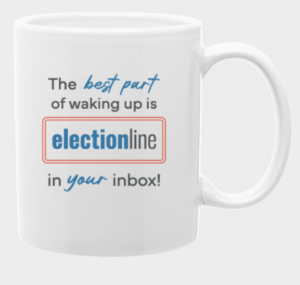 What’s the best part of waking up? electionline Daily News in your inbox of course so be sure to sign up for your daily dose.
What’s the best part of waking up? electionline Daily News in your inbox of course so be sure to sign up for your daily dose.
Each morning you’ll receive the top headlines of the day, plus a listing of states featured in that day’s news round up.
To sign up, simply visit our site and provide us with your email and you’ll begin receiving the news in your inbox each morning.
We Google so you don’t have to!
New Research and Resources
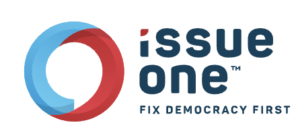 Resources from Issue One: This week Issue One released new resources for elections officials to use on election integrity and de-escalation. National Election Integrity Toolkit is designed to help explain how the election process works and increase confidence in the integrity and fairness of elections. The toolkit offers messaging, clear information, and shareable content to promote Americans’ freedom to vote. In addition to a keystone national toolkit, there are BOTH infographics and fact sheets for seven states (Arizona, Nevada, Michigan, Wisconsin, Pennsylvania, North Carolina and Georgia). Additionally, as Issue One was preparing a response for the attempted assassination of the former president, they found guidance for election administrators and for specific demographic groups, but couldn’t find a good guide for people in communities to de-escalate and focus on elections. So, based on best research and practice, the team put together a de-escalation pamphlet and de-escalation handout for electronic distribution.
Resources from Issue One: This week Issue One released new resources for elections officials to use on election integrity and de-escalation. National Election Integrity Toolkit is designed to help explain how the election process works and increase confidence in the integrity and fairness of elections. The toolkit offers messaging, clear information, and shareable content to promote Americans’ freedom to vote. In addition to a keystone national toolkit, there are BOTH infographics and fact sheets for seven states (Arizona, Nevada, Michigan, Wisconsin, Pennsylvania, North Carolina and Georgia). Additionally, as Issue One was preparing a response for the attempted assassination of the former president, they found guidance for election administrators and for specific demographic groups, but couldn’t find a good guide for people in communities to de-escalate and focus on elections. So, based on best research and practice, the team put together a de-escalation pamphlet and de-escalation handout for electronic distribution.
Election News This Week
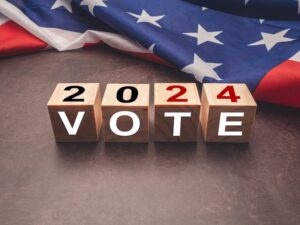 2024 Primary Updates: Since our last update five states – Kansas, Michigan, Missouri, Tennessee, Washington – as well as Guam and the U.S. Virgin Islands have held primary contests.
2024 Primary Updates: Since our last update five states – Kansas, Michigan, Missouri, Tennessee, Washington – as well as Guam and the U.S. Virgin Islands have held primary contests.
On August 1 voters in Tennessee where turnout during both early voting and on primary Thursday was reported to be light statewide. Sullivan County Election Administrator Jason Booher and Hawkins County Election Administrator Crystal Rogers both reported light turnout and no real problems. “Historically, August turnout is low,” Alan Farley Rutherford County elections administrator said. “Most people are focusing on getting in a few vacation days before school starts or their attention is focused on getting prepared on school starting. Presidential elections are our highest turnout elections. We will be north of 60% turnout in November.”
On Saturday, August 3 voters on Guam and the U.S. Virgin Islands hit the polls for primaries. Both archipelagos note low voter turnout. “Yes, it was low voter turnout but the thing to also remember is that our voter registry has gone up to over 60,000,” said Guam Election Commission Executive Director Maria Pangelinan. Overall, 31.16% of voters showed up. “We try our best. Let us know how else to entice the voter to come in. Early voting is very efficient,” said Pangelinan. In USVI, turnout was low both on primary day and during early voting. Some attributed that to the issues surrounding this year’s primary. The primary faced significant challenges this year. In January, District Court Chief Judge Robert Molloy ruled eight sections of the V.I. Code governing primary elections unconstitutional. In a Senate hearing, Elections Supervisor Caroline Fawkes stated that “a normal primary election would be impossible without some change.” The Board of Elections scrambled and, in an emergency meeting at the end of May, worked out a plan to exclude intra-party offices from the ballot but keep the names of people running for public office.
On Tuesday, it was a quiet day at the polls in Kansas on Tuesday with some voters telling the Kansas Reflector that they voted out of a sense of obligation. “I’m kind of disenchanted, but I do feel like it’s an obligation, but also a right, also a privilege. So, I do it,” voter Kathy McDowell said in Douglas County.
Power outages and humid ink made headlines in Michigan where more than one million voters cast their ballots in advance of Tuesday’s primary. Secretary of State Jocelyn Benson said Tuesday night that she expected totals to be near 2 million, which would be less than a quarter of the state’s total registered voters. “At this point, most people are just ready for November,” Canton Township Clerk Michael Siegrist said. Severe weather most likely impacted turnout as well. At some voting locations in St. Joseph County, voters were asked to shelter in place during a tornado warning that hit the area Tuesday morning. Weather-related issues led to a minor disruption at polling places in metro Detroit after power outages led to the relocation of multiple precincts. Voters in Flint voiced concerns about several of the city’s voting precincts changing or moving as part of the redistricting process. Livonia City Clerk Lori Miller told 7 News Detroit, “We’re having a great turnout here at the precincts, higher than normal and we had an en excellent turnout in our early voting site.” She said the rise in early voting has made in-person voting move quickly. “It does take the strain off the precincts, so there’s less lines, less waiting, but still a higher voter turnout,” said Miller. Law enforcement is investigating a possible incident of voter intimidation Tuesday in Crawford County, officials said. A member of a state elections ground team conducting election check-ins around the state witnessed the incident in Beaver Creek Township in which people who were campaigning partly blocked an entrance to a polling location, said Angela Benander, a spokeswoman for the Michigan Department of State.
It was a quiet day in Missouri with only a few reported problems. Greene County Clerk Shane Schoeller says things have gone smoothly at the polls, but the turnout has been lighter than he expected. Lauri Ealom, the Democratic Election Board director for Kansas City said voter turnout for Tuesday’s primary election seemed lower than she expected. Nodaway County Clerk Melinda Patton said voters were frustrated due to having to show photo ID to cast their ballot, not their voter ID card. A vendor glitch caused the delay of results being posted on the St. Charles County website. “It’s frustrating because we want to give that information to the voters as quickly as possible. We work with the voters obviously all day long to help voters cast their vote, but our day isn’t over until we have tallied that vote and given voters the knowledge of who won,” St. Charles County Director of Elections Kurt Bahr said. In Joplin County election judges spoke with reporters about why they do what they do. “You know, looking at the ballot I get the feeling inside like this is cool, I’m glad we get to do this,” said Jerry Reinke, Jasper County Supervisor Judge. In the race for secretary of state, Republican Denny Hoskins will face Democrat Barbara Phifer in November.
Even though Washington now offers some election day vote centers, most Washingtonians continued to vote by mail. The only real reported issue seemed to occur in Whatcom County where a ballot drop box got clogged.
 Early Voting News: The start of early voting in parts of Alaska and Florida were delayed this week for very different reasons. In parts of rural Alaska early voting for the August 20 primary was delayed due to postal delays. Alaska has only a handful of true early voting sites that are set up like Election Day polling places. In smaller communities, the state distributes blank absentee ballots and allows voters to cast “absentee in person” votes that are then mailed through the normal absentee ballot process. In places where mail delivery is often slow, it’s frequently a faster way to vote before Election Day. But this year, some absentee ballot packages were delayed getting to their final destination. In Bethel, ballots didn’t arrive until Tuesday afternoon. In Utqiagvik and Kotzebue, they arrived Wednesday. Altogether, eight communities didn’t receive their packages until Monday, nine got them on Tuesday, and as of Wednesday afternoon, 14 communities were still waiting for their ballots, said Carol Beecher, the division director. In some cases, the delays were due to bad weather. In others, the person designated to pick up the mail from the airport wasn’t answering the phone. Hurricane Debby forced some Florida counties to make adjustments to their early voting schedules. Alachua County delayed their start till Tuesday and Duval County until Wednesday. Also in Florida, the historic town of Eatonville has its first early voting location as part of the ongoing early voting efforts in Orange County. And advocates and voters in Duval County are celebrating the return of an early voting site to the campus of Edward Waters University which last hosted a site in 2018. In Wisconsin, for the first time, voters are able to cast early voting ballots in locations other than city hall. This week marked the start of in-person absentee voting at the Green Bay’s two new early satellite voting sites. And in Connecticut, local election workers have been testing out the early voting process this week as part of primary votes across the state. Secretary of State Stephanie Thomas’ office said 3,380 voters cast ballots during the first two days of early voting leading up to the Aug. 13 primary.
Early Voting News: The start of early voting in parts of Alaska and Florida were delayed this week for very different reasons. In parts of rural Alaska early voting for the August 20 primary was delayed due to postal delays. Alaska has only a handful of true early voting sites that are set up like Election Day polling places. In smaller communities, the state distributes blank absentee ballots and allows voters to cast “absentee in person” votes that are then mailed through the normal absentee ballot process. In places where mail delivery is often slow, it’s frequently a faster way to vote before Election Day. But this year, some absentee ballot packages were delayed getting to their final destination. In Bethel, ballots didn’t arrive until Tuesday afternoon. In Utqiagvik and Kotzebue, they arrived Wednesday. Altogether, eight communities didn’t receive their packages until Monday, nine got them on Tuesday, and as of Wednesday afternoon, 14 communities were still waiting for their ballots, said Carol Beecher, the division director. In some cases, the delays were due to bad weather. In others, the person designated to pick up the mail from the airport wasn’t answering the phone. Hurricane Debby forced some Florida counties to make adjustments to their early voting schedules. Alachua County delayed their start till Tuesday and Duval County until Wednesday. Also in Florida, the historic town of Eatonville has its first early voting location as part of the ongoing early voting efforts in Orange County. And advocates and voters in Duval County are celebrating the return of an early voting site to the campus of Edward Waters University which last hosted a site in 2018. In Wisconsin, for the first time, voters are able to cast early voting ballots in locations other than city hall. This week marked the start of in-person absentee voting at the Green Bay’s two new early satellite voting sites. And in Connecticut, local election workers have been testing out the early voting process this week as part of primary votes across the state. Secretary of State Stephanie Thomas’ office said 3,380 voters cast ballots during the first two days of early voting leading up to the Aug. 13 primary.
 Artificial Intelligence News: A bipartisan group of secretaries of state blasted Elon Musk and his X platform for providing “false information” about Vice President Kamala Harris’ supposed ineligibility to appear on the 2024 presidential ballot in several battleground states. The group flagged issues that emerged last month with the AI-powered Grok chatbot on X, formerly known as Twitter. Soon after President Joe Biden ended his reelection campaign, Grok provided information to some users inaccurately stating that, “The ballot deadline has passed for several states for the 2024 election,” in nine states including Pennsylvania, Michigan, Texas and Ohio, according to the letter. “This is false,” the letter says. “In all nine states the opposite is true: The ballots are not closed, and upcoming ballot deadlines would allow for changes to candidates listed on the ballot for the offices of President and Vice President of the United States.” The letter urged Musk to “immediately implement changes” on the X platform. They want him to direct users to a nonpartisan website from the National Association of Secretaries of State where voters can look up reliable information about their registration status and polling-place locations. Election officials from five of the nine affected states – Pennsylvania, Michigan, Minnesota, New Mexico and Washington state – signed onto the letter. While Grok is available only to subscribers to the premium versions of X, the misinformation was shared across multiple social media platforms and reached millions of people, according to the letter. The bogus ballot deadline information from the chatbot also referenced Alabama, Indiana, Ohio and Texas, although their secretaries of state did not sign the letter. Grok continued to repeat the false information for 10 days before it was corrected, the secretaries said.
Artificial Intelligence News: A bipartisan group of secretaries of state blasted Elon Musk and his X platform for providing “false information” about Vice President Kamala Harris’ supposed ineligibility to appear on the 2024 presidential ballot in several battleground states. The group flagged issues that emerged last month with the AI-powered Grok chatbot on X, formerly known as Twitter. Soon after President Joe Biden ended his reelection campaign, Grok provided information to some users inaccurately stating that, “The ballot deadline has passed for several states for the 2024 election,” in nine states including Pennsylvania, Michigan, Texas and Ohio, according to the letter. “This is false,” the letter says. “In all nine states the opposite is true: The ballots are not closed, and upcoming ballot deadlines would allow for changes to candidates listed on the ballot for the offices of President and Vice President of the United States.” The letter urged Musk to “immediately implement changes” on the X platform. They want him to direct users to a nonpartisan website from the National Association of Secretaries of State where voters can look up reliable information about their registration status and polling-place locations. Election officials from five of the nine affected states – Pennsylvania, Michigan, Minnesota, New Mexico and Washington state – signed onto the letter. While Grok is available only to subscribers to the premium versions of X, the misinformation was shared across multiple social media platforms and reached millions of people, according to the letter. The bogus ballot deadline information from the chatbot also referenced Alabama, Indiana, Ohio and Texas, although their secretaries of state did not sign the letter. Grok continued to repeat the false information for 10 days before it was corrected, the secretaries said.
 Sticker News: Washington County, Wisconsin announced the winners of their 2024 “I Voted” sticker contest this week. Hundreds of creative entries were sent in by area students, and after the public online voting ended on the first ever “I Voted” sticker design competition in Washington County, the results are in! Plans are underway to recognize the designers of the winning entries at the next County Board meeting.
Sticker News: Washington County, Wisconsin announced the winners of their 2024 “I Voted” sticker contest this week. Hundreds of creative entries were sent in by area students, and after the public online voting ended on the first ever “I Voted” sticker design competition in Washington County, the results are in! Plans are underway to recognize the designers of the winning entries at the next County Board meeting.
Personnel News: Jenna Kuick has been hired as Dexter, Michigan’s first full-time city clerk.
Ballot Measures, Legislation & Rulemaking
 Colorado Ballot Measure: Colorado Voters First, an elections reform group, says it has submitted 213,000 signatures to the Colorado secretary of state’s office in support of a sweeping measure to abolish party primaries and adopt ranked choice voting. The submission makes it likely that Initiative 310 will comfortably exceed the minimum threshold of 124,238 valid signatures to qualify for the November ballot once its petitions are verified by the secretary of state. The initiative proposes to replace Colorado’s partisan primary system with a single “all-candidate primary” for each state and federal office. The top four candidates would advance to a general election decided by ranked choice voting, also known as instant runoff voting. Under this method, voters would rank as many or as few of the four candidates as they wish, and candidates with the fewest first-place votes are eliminated until one candidate receives a majority. Local elections officials across the state have been cool towards the proposal, fretting over the feasibility of implementing the new system on the timeline envisioned by Thiry and his allies. With support from the Colorado County Clerks Association, a last-minute amendment to an elections bill passed at the end of the 2024 legislative session erected several significant obstacles that could delay the initiative’s implementation. But alongside top Democrats and Republicans in the Legislature, Democratic Gov. Jared Polis said upon signing the bill in May that state leaders will “take prompt and good faith actions to successfully implement the will of the voters” if the measure passes, promising the measure’s reforms would take effect “no later than the 2028 election cycle.”
Colorado Ballot Measure: Colorado Voters First, an elections reform group, says it has submitted 213,000 signatures to the Colorado secretary of state’s office in support of a sweeping measure to abolish party primaries and adopt ranked choice voting. The submission makes it likely that Initiative 310 will comfortably exceed the minimum threshold of 124,238 valid signatures to qualify for the November ballot once its petitions are verified by the secretary of state. The initiative proposes to replace Colorado’s partisan primary system with a single “all-candidate primary” for each state and federal office. The top four candidates would advance to a general election decided by ranked choice voting, also known as instant runoff voting. Under this method, voters would rank as many or as few of the four candidates as they wish, and candidates with the fewest first-place votes are eliminated until one candidate receives a majority. Local elections officials across the state have been cool towards the proposal, fretting over the feasibility of implementing the new system on the timeline envisioned by Thiry and his allies. With support from the Colorado County Clerks Association, a last-minute amendment to an elections bill passed at the end of the 2024 legislative session erected several significant obstacles that could delay the initiative’s implementation. But alongside top Democrats and Republicans in the Legislature, Democratic Gov. Jared Polis said upon signing the bill in May that state leaders will “take prompt and good faith actions to successfully implement the will of the voters” if the measure passes, promising the measure’s reforms would take effect “no later than the 2028 election cycle.”
 District of Columbia Ballot Measure: D.C. voters will decide in November whether to make major changes to the city’s elections system after the D.C. Board of Elections on Friday certified a ballot initiative that, if approved, would bring ranked-choice voting and semi-open primaries to the District. The board voted to place Initiative 83 on the ballot after finding supporters had gathered enough valid signatures to qualify. The initiative will jointly ask voters to open primary elections to registered independents — who can’t participate in them — and to change how votes are tallied through ranked-choice voting. That method allows voters to rank up to five candidates in order of preference and is intended to ensure that the winner receives at least 50 percent of the vote. Board of Elections officials said that of more than 40,000 petition signatures the Make All Votes Count campaign submitted, 27,773 were found to be valid — beyond the minimum requirement of about 22,500. Signature reviewers rejected 4,802 signatures for use of Wite-Out that appeared to affect voter intent, and rejected thousands more for other issues such as not being from valid registered D.C. voters, officials said. Board of Elections Chairman Gary Thompson said he felt confident the process was transparent and the small army of petition reviewers scrutinized every petition signature with “painstaking care.” He repeated several times that the board was neutral about the initiative, adding at one point that he was undecided and looked forward to hearing the arguments for and against.
District of Columbia Ballot Measure: D.C. voters will decide in November whether to make major changes to the city’s elections system after the D.C. Board of Elections on Friday certified a ballot initiative that, if approved, would bring ranked-choice voting and semi-open primaries to the District. The board voted to place Initiative 83 on the ballot after finding supporters had gathered enough valid signatures to qualify. The initiative will jointly ask voters to open primary elections to registered independents — who can’t participate in them — and to change how votes are tallied through ranked-choice voting. That method allows voters to rank up to five candidates in order of preference and is intended to ensure that the winner receives at least 50 percent of the vote. Board of Elections officials said that of more than 40,000 petition signatures the Make All Votes Count campaign submitted, 27,773 were found to be valid — beyond the minimum requirement of about 22,500. Signature reviewers rejected 4,802 signatures for use of Wite-Out that appeared to affect voter intent, and rejected thousands more for other issues such as not being from valid registered D.C. voters, officials said. Board of Elections Chairman Gary Thompson said he felt confident the process was transparent and the small army of petition reviewers scrutinized every petition signature with “painstaking care.” He repeated several times that the board was neutral about the initiative, adding at one point that he was undecided and looked forward to hearing the arguments for and against.
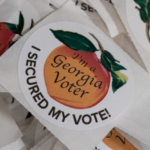 Georgia Rulemaking: The State Election Board pushed through proposed election rules August 6 that have sparked fierce debates over giving county officials greater authority to refuse to certify voter tallies. Currently, certification by local election boards is considered an administrative task that doesn’t allow members to delay as they investigate results provided to them by county officials. The new process could delay the certification of a Georgia election in a large county if a single board member called for an investigation into equipment or administration of the vote. This week’s election board meeting comes on the heels of a campaign rally in Atlanta where former President Donald Trump praised conservative Georgia election board members Rick Jeffares, Janice Johnston and Janelle King for their staunch support of new election policies in Georgia. That included the rule adopted Tuesday that allows local election boards members to exercise their discretion of “reasonable inquiry” to review documents and other election-related information prior to voting on certification. Under Georgia law, county election boards are required to vote on certifying election results within six days after Election Day. The Georgia Secretary of State is mandated by law to verify the statewide results for the upcoming presidential election by Nov. 22. The new rule allows local election board members to request insight from election supervisors and staff as well as access other election-related materials to base their decision to sign off on the vote count local officials provide, or refuse to certify the results. The new rule could lead to more legal challenges over a state law that still requires county boards to certify the results as part of their normal election duties. Several Republican Georgia county election officials declined to certify the results of recent elections, but their efforts were thwarted by boards controlled by Democrats.
Georgia Rulemaking: The State Election Board pushed through proposed election rules August 6 that have sparked fierce debates over giving county officials greater authority to refuse to certify voter tallies. Currently, certification by local election boards is considered an administrative task that doesn’t allow members to delay as they investigate results provided to them by county officials. The new process could delay the certification of a Georgia election in a large county if a single board member called for an investigation into equipment or administration of the vote. This week’s election board meeting comes on the heels of a campaign rally in Atlanta where former President Donald Trump praised conservative Georgia election board members Rick Jeffares, Janice Johnston and Janelle King for their staunch support of new election policies in Georgia. That included the rule adopted Tuesday that allows local election boards members to exercise their discretion of “reasonable inquiry” to review documents and other election-related information prior to voting on certification. Under Georgia law, county election boards are required to vote on certifying election results within six days after Election Day. The Georgia Secretary of State is mandated by law to verify the statewide results for the upcoming presidential election by Nov. 22. The new rule allows local election board members to request insight from election supervisors and staff as well as access other election-related materials to base their decision to sign off on the vote count local officials provide, or refuse to certify the results. The new rule could lead to more legal challenges over a state law that still requires county boards to certify the results as part of their normal election duties. Several Republican Georgia county election officials declined to certify the results of recent elections, but their efforts were thwarted by boards controlled by Democrats.
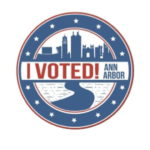 Ann Arbor, Michigan Ballot Measure: Two proposals aiming to reform Ann Arbor elections are on their way to the November ballot with over 11,000 signatures collected. The Coalition for Ann Arbor’s Future announced, August 6, the city clerk’s office has certified the grassroots group has enough petition signatures to put both proposed city charter amendments to voters Nov. 5. One proposal would make mayor and City Council races nonpartisan, while the other seeks to establish public campaign financing for those races, using city taxpayer funds. City Clerk Jackie Beaudry confirmed she notified the group that both petitions met the requirement of having signatures from at least 5,705 registered city voters. One had 5,843 and the other had 5,868. She is forwarding the ballot language to the governor and attorney general for their review now, she said.
Ann Arbor, Michigan Ballot Measure: Two proposals aiming to reform Ann Arbor elections are on their way to the November ballot with over 11,000 signatures collected. The Coalition for Ann Arbor’s Future announced, August 6, the city clerk’s office has certified the grassroots group has enough petition signatures to put both proposed city charter amendments to voters Nov. 5. One proposal would make mayor and City Council races nonpartisan, while the other seeks to establish public campaign financing for those races, using city taxpayer funds. City Clerk Jackie Beaudry confirmed she notified the group that both petitions met the requirement of having signatures from at least 5,705 registered city voters. One had 5,843 and the other had 5,868. She is forwarding the ballot language to the governor and attorney general for their review now, she said.
 Ypsilanti, Michigan Ballot Measure: A group of Ypsilanti residents have appeared to have gathered enough signatures to place a charter amendment on the November ballot eliminating the partisan primary for city races. The proposal would do away with the primary and instead place all candidates on the same ballot without party affiliation. The group Ypsi BIG gathered the signatures for the initiative. Organizer Em Hoepner says the change would increase participation. She says with only Democrats tending to file for office, the low-turnout primary becomes the de facto general election. Ypsilanti 2nd Ward Councilman Patrick McLean strongly opposes eliminating the partisan primary. He says it would deprive voters of basic information regarding a candidate’s party affiliation and could lead to extremists getting elected with a small plurality of the vote.
Ypsilanti, Michigan Ballot Measure: A group of Ypsilanti residents have appeared to have gathered enough signatures to place a charter amendment on the November ballot eliminating the partisan primary for city races. The proposal would do away with the primary and instead place all candidates on the same ballot without party affiliation. The group Ypsi BIG gathered the signatures for the initiative. Organizer Em Hoepner says the change would increase participation. She says with only Democrats tending to file for office, the low-turnout primary becomes the de facto general election. Ypsilanti 2nd Ward Councilman Patrick McLean strongly opposes eliminating the partisan primary. He says it would deprive voters of basic information regarding a candidate’s party affiliation and could lead to extremists getting elected with a small plurality of the vote.
 Albuquerque, New Mexico: Albuquqerque’s voting system, which requires a candidate to receive 50% of the vote to win, will remain in place. On August 5, Albuquerque City Council rejected an override to Mayor Tim Keller’s veto of a bill that would have allowed a plurality voting system and eliminated run-off elections. Councilors originally passed the measure that would have gone on the November ballot but the mayor vetoed it. It was a 5-4 vote which is one vote short to override a veto. The ballot measure would have let voters decide if the election for mayor and city council seats should be based on who receives the most votes or if there should be a minimum threshold. Currently, to get elected, a candidate needs to receive at least 50% of the votes as well as receive more votes than other candidates to be considered the winner. City council considered changing that so that candidates could win if they received less than 50% of the votes, but still had more votes than any other candidate.
Albuquerque, New Mexico: Albuquqerque’s voting system, which requires a candidate to receive 50% of the vote to win, will remain in place. On August 5, Albuquerque City Council rejected an override to Mayor Tim Keller’s veto of a bill that would have allowed a plurality voting system and eliminated run-off elections. Councilors originally passed the measure that would have gone on the November ballot but the mayor vetoed it. It was a 5-4 vote which is one vote short to override a veto. The ballot measure would have let voters decide if the election for mayor and city council seats should be based on who receives the most votes or if there should be a minimum threshold. Currently, to get elected, a candidate needs to receive at least 50% of the votes as well as receive more votes than other candidates to be considered the winner. City council considered changing that so that candidates could win if they received less than 50% of the votes, but still had more votes than any other candidate.
 New York: Gov. Kathy Hochul signed several pieces of legislation into law August 6 aimed to improve voter protections and accessibility, her office announced. The bills the governor signed will: Allow pre-registered voters, individuals who will be 18 years old by Election Day, to apply for an absentee or early mail voting ballot; Ensure New Yorkers are able to cure ballot defects within the required timeframes; Create a standard ordering criteria for candidates appearing on a ballot; Bring state election law into compliance with the requirements set under the federal Electoral Count Reform Act; Expand poll watcher eligibility to include most New York state attorneys; Make technical changes related to town elections; and Clarify administrative processes for preclearance coverage determinations under the John R. Lewis Voting Rights Act of New York “Our democracy is rooted in the sacrifices of those willing to fight for that idea greater than any one of us, and with this legislation, we are strengthening our efforts to protect it,” Hochul said in a statement. “Every New Yorker deserves the opportunity to have their voice heard, and these laws bring the ideals of self-governance closer to reality.”
New York: Gov. Kathy Hochul signed several pieces of legislation into law August 6 aimed to improve voter protections and accessibility, her office announced. The bills the governor signed will: Allow pre-registered voters, individuals who will be 18 years old by Election Day, to apply for an absentee or early mail voting ballot; Ensure New Yorkers are able to cure ballot defects within the required timeframes; Create a standard ordering criteria for candidates appearing on a ballot; Bring state election law into compliance with the requirements set under the federal Electoral Count Reform Act; Expand poll watcher eligibility to include most New York state attorneys; Make technical changes related to town elections; and Clarify administrative processes for preclearance coverage determinations under the John R. Lewis Voting Rights Act of New York “Our democracy is rooted in the sacrifices of those willing to fight for that idea greater than any one of us, and with this legislation, we are strengthening our efforts to protect it,” Hochul said in a statement. “Every New Yorker deserves the opportunity to have their voice heard, and these laws bring the ideals of self-governance closer to reality.”
 Pennsylvania: State Rep. Brad Roae (R-Meadville) wants to make it easier for Pennsylvania residents to follow election results. Rose has introduced a co-sponsorship memorandum for legislation he is drafting that would require the Pennsylvania Department of State to restore information on Election Night that tells voters how many voting precincts have reported their data. “The Department of State removed an election result transparency feature from their website about five years ago and I will soon introduce legislation to mandate its return,” Rose wrote in his memorandum. “The election returns portion of the Department of State website previously showed how many voting precincts there were and how many precincts had been counted. It also showed what percent of the precincts had reported. The Department of State still gets this information, but they removed it from their website so that citizens can no longer see it. My legislation would mandate that it be included again on their election return website.”
Pennsylvania: State Rep. Brad Roae (R-Meadville) wants to make it easier for Pennsylvania residents to follow election results. Rose has introduced a co-sponsorship memorandum for legislation he is drafting that would require the Pennsylvania Department of State to restore information on Election Night that tells voters how many voting precincts have reported their data. “The Department of State removed an election result transparency feature from their website about five years ago and I will soon introduce legislation to mandate its return,” Rose wrote in his memorandum. “The election returns portion of the Department of State website previously showed how many voting precincts there were and how many precincts had been counted. It also showed what percent of the precincts had reported. The Department of State still gets this information, but they removed it from their website so that citizens can no longer see it. My legislation would mandate that it be included again on their election return website.”
 Knoxville, Tennessee: The City Council met August 1 to consider proposals aimed at preserving the way the city conducts its elections after a state law went into effect requiring the city to change its election structure. The council passed a proposal on an emergency basis that is aimed at complying with state law while also preserving citywide elections. Voters will now need to consider that proposal in November. When they go to the ballot, voters in Knoxville will be presented with two options: either implement district-limited voting or implement a citywide, at-large voting system with candidate residency requirements. The decision comes after Tennessee lawmakers passed a new law impacting Knoxville elections. The new state law was condemned by the Knoxville vice mayor and most members of the Knoxville City Council as an overreach of state power. Governor Bill Lee signed the law in May 2023 and it took effect on Jan. 1. Previously, when Knoxville voters headed to the polls during city primary elections, they were allowed to vote for candidates only in their district. During the city general elections, however, Knoxville voters could vote for candidates in every city council election, including districts outside the one they live in. The law aims to put a stop to that style of voting and instead requires the city to follow how most state municipalities choose leaders, mostly by implementing district-limited elections.
Knoxville, Tennessee: The City Council met August 1 to consider proposals aimed at preserving the way the city conducts its elections after a state law went into effect requiring the city to change its election structure. The council passed a proposal on an emergency basis that is aimed at complying with state law while also preserving citywide elections. Voters will now need to consider that proposal in November. When they go to the ballot, voters in Knoxville will be presented with two options: either implement district-limited voting or implement a citywide, at-large voting system with candidate residency requirements. The decision comes after Tennessee lawmakers passed a new law impacting Knoxville elections. The new state law was condemned by the Knoxville vice mayor and most members of the Knoxville City Council as an overreach of state power. Governor Bill Lee signed the law in May 2023 and it took effect on Jan. 1. Previously, when Knoxville voters headed to the polls during city primary elections, they were allowed to vote for candidates only in their district. During the city general elections, however, Knoxville voters could vote for candidates in every city council election, including districts outside the one they live in. The law aims to put a stop to that style of voting and instead requires the city to follow how most state municipalities choose leaders, mostly by implementing district-limited elections.
 Virginia: Governor Glenn Youngkin (R) issued Executive Order 35 this week, which codifies the election security procedures, including stringent ballot security, complete and thorough counting machine testing, and voter list maintenance. The order codifies improvements to election security made during Youngkin’s administration by directing the Commissioner of the Department of Elections to certify in writing annually that these improvements are in place. The EO also outlines the procedures in place for non-citizens who attempt to violate the law and register to vote, including referral to the local Commonwealth’s attorney and the Office of Attorney General, which has concurrent jurisdiction.
Virginia: Governor Glenn Youngkin (R) issued Executive Order 35 this week, which codifies the election security procedures, including stringent ballot security, complete and thorough counting machine testing, and voter list maintenance. The order codifies improvements to election security made during Youngkin’s administration by directing the Commissioner of the Department of Elections to certify in writing annually that these improvements are in place. The EO also outlines the procedures in place for non-citizens who attempt to violate the law and register to vote, including referral to the local Commonwealth’s attorney and the Office of Attorney General, which has concurrent jurisdiction.
Legal Updates
 Arizona: The 9th Circuit Court of Appeals reversed itself August 1, allowing Arizonans again to register to vote in federal races without having to prove citizenship. It’s another swerve in the legal battle over a 2022 law that aims ultimately to reverse a portion of the National Voter Registration Act and require all Arizona voters to show proof of citizenship to register to vote. The order reopens a path for potential voters who just two weeks ago were barred from using the state voter registration form to sign up to vote unless they could produce proof of U.S. citizenship. It comes with two months left before the Oct. 7 registration deadline for the high-stakes presidential election. The order means people can again use the state-issued voter registration form even if they don’t produce proof of citizenship. Instead, they attest under penalty of perjury that they are citizens, and are limited to voting in federal races only. In the first 10 days after the July 18 ruling that required the documentary proof, the Maricopa County Recorder’s Office said it had rejected 200 voter applications. Following the ruling, the Arizona Secretary of State’s Office clarified the impact of the ruling. “Election officials may not reject voter registration applications submitted without DPOC, regardless of which form is used,” communications director Aaron Thacker said. DPOC is shorthand for documentary proof of citizenship. Senate President Warren Petersen vowed to seek an emergency stay from the U.S. Supreme Court “to make sure only American citizens are voting in our elections.”
Arizona: The 9th Circuit Court of Appeals reversed itself August 1, allowing Arizonans again to register to vote in federal races without having to prove citizenship. It’s another swerve in the legal battle over a 2022 law that aims ultimately to reverse a portion of the National Voter Registration Act and require all Arizona voters to show proof of citizenship to register to vote. The order reopens a path for potential voters who just two weeks ago were barred from using the state voter registration form to sign up to vote unless they could produce proof of U.S. citizenship. It comes with two months left before the Oct. 7 registration deadline for the high-stakes presidential election. The order means people can again use the state-issued voter registration form even if they don’t produce proof of citizenship. Instead, they attest under penalty of perjury that they are citizens, and are limited to voting in federal races only. In the first 10 days after the July 18 ruling that required the documentary proof, the Maricopa County Recorder’s Office said it had rejected 200 voter applications. Following the ruling, the Arizona Secretary of State’s Office clarified the impact of the ruling. “Election officials may not reject voter registration applications submitted without DPOC, regardless of which form is used,” communications director Aaron Thacker said. DPOC is shorthand for documentary proof of citizenship. Senate President Warren Petersen vowed to seek an emergency stay from the U.S. Supreme Court “to make sure only American citizens are voting in our elections.”
Maricopa County Superior Court Judge Jennifer Ryan-Touhill has ruled that Arizona’s rules aimed at preventing specific types of voter intimidation and harassment near polling places and drop boxes are too broad and violate free speech rights. The rules, some of which have been in place for years, prohibit anyone from following, photographing, videotaping, or yelling at voters outside drop boxes or polling places, along with other activities that Secretary of State Adrian Fontes had declared were intimidating. August 6’s injunction from Ryan-Touhill temporarily prohibits Arizona officials from enforcing the rules, until the court can issue a final ruling in the matter. The ruling comes just two months before early voting begins for the presidential election, and as Republican groups pledge to watch over the polls. The Republican National Committee, for example, launched a “Protect the Vote” tour in June to recruit poll watchers, poll workers, and lawyers to “ensure it is easy to vote and hard to cheat.” Fontes’s office said in a statement Tuesday that it will appeal the order. “While we respect the court’s decision to halt certain speech restrictions, implementing a preliminary injunction for the general election would be too far-reaching,” the statement said.
 California: Federal prosecutors and Los Angeles County have settled allegations that voters with mobility and vision disabilities were excluded for years at local polling places in violation of the Americans with Disabilities Act, officials announced on August 1. The U.S. Attorney’s Office sued the county last year, alleging that a seven-year probe into the county’s voting program found that disabled residents were prevented from voting in person as far back as 2016. Investigators who surveyed more than 100 county voting centers noted such architectural barriers as steep ramps, abrupt level changes at walkways and entrance doors, and lack of accessible parking. The impediments prevented people with mobility and vision disabilities from being able to safely access vote centers and cast their ballots in person, according to the U.S. Attorney’s Office. The lawsuit filed in Los Angeles federal court also alleged that the county’s curbside voting program was inaccessible, as certain polling centers lacked signage indicating that curbside voting was available or failed to provide sufficient means for a voter to contact an election worker for assistance with curbside voting. County Registrar-Recorder/County Clerk Dean C. Logan said in a statement that while no systemic deficiencies were identified in the probe, aging infrastructure and facilities were partly to blame for access issues. The county’s agreement with the federal government will spur a focus on “the intricacies of sidewalk slopes, public transit access, and clear paths of travel leading to voting areas,” he said. Under the settlement, the county will work with an independent accessibility expert on site selection policies and procedures to ensure that facilities, buildings, sites or locations chosen to serve as vote centers are ADA compliant or can be made more accessible during the voting period by employing temporary measures. The expert will provide biannual reports on the county’s progress, according to the agreement.
California: Federal prosecutors and Los Angeles County have settled allegations that voters with mobility and vision disabilities were excluded for years at local polling places in violation of the Americans with Disabilities Act, officials announced on August 1. The U.S. Attorney’s Office sued the county last year, alleging that a seven-year probe into the county’s voting program found that disabled residents were prevented from voting in person as far back as 2016. Investigators who surveyed more than 100 county voting centers noted such architectural barriers as steep ramps, abrupt level changes at walkways and entrance doors, and lack of accessible parking. The impediments prevented people with mobility and vision disabilities from being able to safely access vote centers and cast their ballots in person, according to the U.S. Attorney’s Office. The lawsuit filed in Los Angeles federal court also alleged that the county’s curbside voting program was inaccessible, as certain polling centers lacked signage indicating that curbside voting was available or failed to provide sufficient means for a voter to contact an election worker for assistance with curbside voting. County Registrar-Recorder/County Clerk Dean C. Logan said in a statement that while no systemic deficiencies were identified in the probe, aging infrastructure and facilities were partly to blame for access issues. The county’s agreement with the federal government will spur a focus on “the intricacies of sidewalk slopes, public transit access, and clear paths of travel leading to voting areas,” he said. Under the settlement, the county will work with an independent accessibility expert on site selection policies and procedures to ensure that facilities, buildings, sites or locations chosen to serve as vote centers are ADA compliant or can be made more accessible during the voting period by employing temporary measures. The expert will provide biannual reports on the county’s progress, according to the agreement.
 Colorado: The trial of former Mesa County Clerk Tina Peters continued this week. Colorado Public Radio has a day-by-day breakdown of how the trial is unfolding. Day 1, Day 2, Day 3, Day 4, Day 5 and Day 6.
Colorado: The trial of former Mesa County Clerk Tina Peters continued this week. Colorado Public Radio has a day-by-day breakdown of how the trial is unfolding. Day 1, Day 2, Day 3, Day 4, Day 5 and Day 6.
Attorney Thomas Quinn, on behalf of Denver-based Salem Media, which hosts conservative talk radio shows, including Wake Up with Randy Corporon. asked the Colorado Court of Appeals on August 6 to reverse a lower court’s denial of anti-SLAPP motions to dismiss a defamation lawsuit filed by a target of 2020 election fraud disinformation. “The plaintiff’s entire case is based on a theme of self-censorship,” Quinn argued. Following the 2020 election, Corporon interviewed Joseph Oltmann, a Castle Rock-based businessman who claimed he heard a man identified as “Eric from Dominion” say on a call that he was going to make sure Trump lost the 2020 election. Internet research led Oltmann to conclude the speaker was Eric Coomer, a director of product strategy and security at Dominion Voting Systems in Denver. The claim sparked and spread like wildfire after the 2020 election, when it was picked up by the OAN network then repeated by the Trump campaign — along with attorneys Rudy Giuliani and Sidney Powell. Locally, attorney Randy Corporon repeated the claims as he interviewed Oltmann on his show. In addition to suing Corporon and Salem for defamation, Coomer filed two other suits seeking to hold accountable more than a dozen individuals and companies that collectively made him the villain in the narrative of baseless claims of election fraud. On June 9, 2023, a Denver judge declined Corporon’s anti-SLAPP special motion to dismiss the suit. Enacted in 2019, the anti-Strategic Lawsuit Against Public Participation law seeks to block frivolous lawsuits to “safeguard the constitutional rights of persons to petition, speak freely, associate freely, and otherwise participate in government to the maximum extent permitted by law.” Corporon and Salem both appealed.
 Georgia: A federal lawsuit is attempting to stop Georgia’s new voter eligibility challenge law, which strengthens the ability of activists to seek cancellations of voters who appear to have moved. The complaint by two voter registration groups, the New Georgia Project and the A. Phillip Randolph Institute, alleges that the voter challenge law violates protections in federal law that set standards for canceling registrations. Under Georgia’s new law, Senate Bill 189, residents can ask county election boards to remove voter registrations if a voter registers in another state, claims a homestead exemption in a different jurisdiction or registers at a nonresidential address. “County boards have purged voters based on unvetted documentation and unreliable information provided by private citizens, such as screenshots of purported property records or social media posts,” plaintiffs allege in the suit filed July 31. The Republican-sponsored law further empowered conservative activists who have disputed over 100,000 voter registrations since 2021. County election boards have rejected most of those challenges. The lawsuit contends that the National Voter Registration Act only allows the cancellation of registrations of voters who have moved after mailed notification that their address needs to be confirmed, and then if they miss the next two general elections; or when a voter confirms in writing that they have moved.
Georgia: A federal lawsuit is attempting to stop Georgia’s new voter eligibility challenge law, which strengthens the ability of activists to seek cancellations of voters who appear to have moved. The complaint by two voter registration groups, the New Georgia Project and the A. Phillip Randolph Institute, alleges that the voter challenge law violates protections in federal law that set standards for canceling registrations. Under Georgia’s new law, Senate Bill 189, residents can ask county election boards to remove voter registrations if a voter registers in another state, claims a homestead exemption in a different jurisdiction or registers at a nonresidential address. “County boards have purged voters based on unvetted documentation and unreliable information provided by private citizens, such as screenshots of purported property records or social media posts,” plaintiffs allege in the suit filed July 31. The Republican-sponsored law further empowered conservative activists who have disputed over 100,000 voter registrations since 2021. County election boards have rejected most of those challenges. The lawsuit contends that the National Voter Registration Act only allows the cancellation of registrations of voters who have moved after mailed notification that their address needs to be confirmed, and then if they miss the next two general elections; or when a voter confirms in writing that they have moved.
 Iowa: Kim Taylor, who’s serving an eight-month sentence following her conviction on dozens of counts of voter fraud, wants a federal appeals court judge to reverse her conviction. At trial, prosecutors proved Taylor manipulated Vietnamese parents into voting on behalf of family members, or otherwise voting illegally. In November, a federal jury convicted Taylor on 52 counts of voter fraud. In April, a federal judge sentenced Taylor to four-months in prison, and four months of home confinement. The Federal Bureau of Prisons website says Taylor is set to be released from a prison in Waseca, Minnesota, on August 25th. In his appeal, Taylor’s attorney says the court should reverse her conviction for insufficient evidence and order a judgment of acquittal on those charges. Or, Taylor’s attorney asks the court to reverse Taylor’s conviction and order a new trial on whatever charges survive the court’s review of the case. Taylor’s attorney insists the trial court denied Taylor’s requested jury instructions regarding good faith, whether she “knowingly” and “willfully” broke the law. Her attorney also says the government lacked sufficient evidence to support each conviction beyond a reasonable doubt. With regard to four of the voters at issue, Taylor’s attorney says the government failed to present evidence that she was involved in the criminal conduct at issue.
Iowa: Kim Taylor, who’s serving an eight-month sentence following her conviction on dozens of counts of voter fraud, wants a federal appeals court judge to reverse her conviction. At trial, prosecutors proved Taylor manipulated Vietnamese parents into voting on behalf of family members, or otherwise voting illegally. In November, a federal jury convicted Taylor on 52 counts of voter fraud. In April, a federal judge sentenced Taylor to four-months in prison, and four months of home confinement. The Federal Bureau of Prisons website says Taylor is set to be released from a prison in Waseca, Minnesota, on August 25th. In his appeal, Taylor’s attorney says the court should reverse her conviction for insufficient evidence and order a judgment of acquittal on those charges. Or, Taylor’s attorney asks the court to reverse Taylor’s conviction and order a new trial on whatever charges survive the court’s review of the case. Taylor’s attorney insists the trial court denied Taylor’s requested jury instructions regarding good faith, whether she “knowingly” and “willfully” broke the law. Her attorney also says the government lacked sufficient evidence to support each conviction beyond a reasonable doubt. With regard to four of the voters at issue, Taylor’s attorney says the government failed to present evidence that she was involved in the criminal conduct at issue.
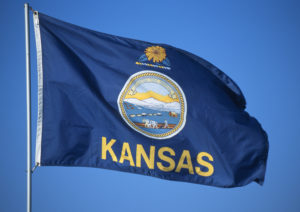 Kansas: Kansas civic groups are resuming voter registration efforts after a three-year-pause due to a law that made it a felony to “represent oneself as an election official.” A case filed by civic groups including Loud Light and the League of Women Voters led to a District Judge Teresa Watson blocking enforcement of the law July 29. The groups argued that the false representation provision put civic organizations at risk because they often provide information and assist with voter registration. They feared such activities could have been construed as representing their members as election officials. The League of Women Voters resumed voter registration efforts in 2022. But Loud Light, a civic group focused on young voters and other civic groups did not resume until the decision last month. This law, Senate substitute for House Bill 2183, was part of a national wave of voter suppression bills passed after the 2020 election. The suppression movement was evident in the most recent Kansas legislative session, too, with proposals such ase limiting advanced voting and adding further verification for mail-in ballots. Watson issued a temporary injunction that restrains and prohibits enforcing the false representation provision. A final decision will be made at trial, where the judge will look at the evidence.
Kansas: Kansas civic groups are resuming voter registration efforts after a three-year-pause due to a law that made it a felony to “represent oneself as an election official.” A case filed by civic groups including Loud Light and the League of Women Voters led to a District Judge Teresa Watson blocking enforcement of the law July 29. The groups argued that the false representation provision put civic organizations at risk because they often provide information and assist with voter registration. They feared such activities could have been construed as representing their members as election officials. The League of Women Voters resumed voter registration efforts in 2022. But Loud Light, a civic group focused on young voters and other civic groups did not resume until the decision last month. This law, Senate substitute for House Bill 2183, was part of a national wave of voter suppression bills passed after the 2020 election. The suppression movement was evident in the most recent Kansas legislative session, too, with proposals such ase limiting advanced voting and adding further verification for mail-in ballots. Watson issued a temporary injunction that restrains and prohibits enforcing the false representation provision. A final decision will be made at trial, where the judge will look at the evidence.
 Minnesota: The Minnesota Supreme Court on August 7 upheld a 2023 state law that restores voting rights for felons once they have completed their prison sentences. The court rejected a challenge from the conservative Minnesota Voters Alliance. A lower court judge had previously thrown out the group’s lawsuit after deciding it lacked the legal standing to sue and failed to prove that the Legislature overstepped its authority when it voted to expand voting rights for people who were formerly incarcerated for a felony. The high court agreed. Before the new law, felons had to complete their probation before they could regain their eligibility to vote. An estimated 55,000 people with felony records gained the right to vote as a result. The timing of the decision is important because early voting for next week’s primary election is already underway. Voting for the Nov. 5 general election begins Sept. 20.
Minnesota: The Minnesota Supreme Court on August 7 upheld a 2023 state law that restores voting rights for felons once they have completed their prison sentences. The court rejected a challenge from the conservative Minnesota Voters Alliance. A lower court judge had previously thrown out the group’s lawsuit after deciding it lacked the legal standing to sue and failed to prove that the Legislature overstepped its authority when it voted to expand voting rights for people who were formerly incarcerated for a felony. The high court agreed. Before the new law, felons had to complete their probation before they could regain their eligibility to vote. An estimated 55,000 people with felony records gained the right to vote as a result. The timing of the decision is important because early voting for next week’s primary election is already underway. Voting for the Nov. 5 general election begins Sept. 20.
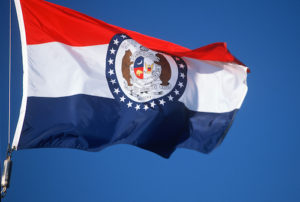 Missouri: Missouri Secretary of State Jay Ashcroft filed a lawsuit against President Joe Biden’s administration over an executive order that promotes access to voter registration. Ashcroft said the executive order violates the United States Constitution. Ashcroft said Biden’s executive order undermined power at the state level and threatened the integrity of our elections. The President signed the executive order 3 years ago. The order called for websites, social media platforms, and other resources to expand access to information to register to vote. Ashcroft’s lawsuit argued the order represented federal overreach. Ashcroft said, “I do not lightly get involved in cases like these, but when the people in this state cannot be sure that their election will be run correctly, and when the federal government is trying to get involved in ways that might violate the right of the people of Missouri to have clean elections that they can trust, and it violates our Constitution, I have to act.”
Missouri: Missouri Secretary of State Jay Ashcroft filed a lawsuit against President Joe Biden’s administration over an executive order that promotes access to voter registration. Ashcroft said the executive order violates the United States Constitution. Ashcroft said Biden’s executive order undermined power at the state level and threatened the integrity of our elections. The President signed the executive order 3 years ago. The order called for websites, social media platforms, and other resources to expand access to information to register to vote. Ashcroft’s lawsuit argued the order represented federal overreach. Ashcroft said, “I do not lightly get involved in cases like these, but when the people in this state cannot be sure that their election will be run correctly, and when the federal government is trying to get involved in ways that might violate the right of the people of Missouri to have clean elections that they can trust, and it violates our Constitution, I have to act.”
 Nevada: Carson City District Court Judge James Russell denied a motion by former President Donald Trump’s campaign and state Republicans to stop counting mail ballots that lack a clear postmark and are received three days after Election Day. Russell denied the request for a preliminary injunction Friday, a spokesperson for the Nevada Attorney General’s Office confirmed to The Nevada Independent. The decision marks the third legal defeat for the Republican National Committee (RNC), Nevada Republican Party and Trump campaign in their efforts to challenge Nevada election laws before the 2024 election. The attorney general’s office did not offer any other details about the ruling. The suit, which challenges election procedures in Nevada, has not yet been dismissed. It hinges on April testimony from Mark Wlaschin, the deputy secretary of state for elections, who said during a public meeting that the office accepts and counts ballots received in the mail as many as three days after Election Day, even if it does not have a clear postmark.
Nevada: Carson City District Court Judge James Russell denied a motion by former President Donald Trump’s campaign and state Republicans to stop counting mail ballots that lack a clear postmark and are received three days after Election Day. Russell denied the request for a preliminary injunction Friday, a spokesperson for the Nevada Attorney General’s Office confirmed to The Nevada Independent. The decision marks the third legal defeat for the Republican National Committee (RNC), Nevada Republican Party and Trump campaign in their efforts to challenge Nevada election laws before the 2024 election. The attorney general’s office did not offer any other details about the ruling. The suit, which challenges election procedures in Nevada, has not yet been dismissed. It hinges on April testimony from Mark Wlaschin, the deputy secretary of state for elections, who said during a public meeting that the office accepts and counts ballots received in the mail as many as three days after Election Day, even if it does not have a clear postmark.
 Pennsylvania: A technical requirement that Pennsylvania voters write accurate dates on the exterior envelope of mail-in ballots was again the subject of a court proceeding on August 1 as advocates argued the mandate unfairly leads to otherwise valid votes being thrown out. A five-judge Commonwealth Court panel heard about two hours of argument in a case that was filed in May, even though the date requirement has been upheld both by the state Supreme Court and the 3rd U.S. Circuit Court of Appeals. The case was brought by the Black Political Empowerment Project, Common Cause and allied advocacy groups against the secretary of state and the elections boards in Philadelphia and Allegheny County, which includes Pittsburgh. They argued that enforcing the date requirement infringes upon voting rights and that none of the prior cases on the topic directly ruled whether it runs afoul of the state constitution’s Free and Equal Elections Clause.
Pennsylvania: A technical requirement that Pennsylvania voters write accurate dates on the exterior envelope of mail-in ballots was again the subject of a court proceeding on August 1 as advocates argued the mandate unfairly leads to otherwise valid votes being thrown out. A five-judge Commonwealth Court panel heard about two hours of argument in a case that was filed in May, even though the date requirement has been upheld both by the state Supreme Court and the 3rd U.S. Circuit Court of Appeals. The case was brought by the Black Political Empowerment Project, Common Cause and allied advocacy groups against the secretary of state and the elections boards in Philadelphia and Allegheny County, which includes Pittsburgh. They argued that enforcing the date requirement infringes upon voting rights and that none of the prior cases on the topic directly ruled whether it runs afoul of the state constitution’s Free and Equal Elections Clause.
 Texas: The U.S. 5th Circuit Court of Appeals has reversed a decades-old precedent that allows different racial and ethnic groups to form coalitions to seek legal remedies under the Voting Rights Act. The ruling — which only applies to the states within the 5th Circuit: Texas, Louisiana and Mississippi — will likely be appealed to the U.S. Supreme Court. In 2021, the Republican-majority government of Galveston County, Texas redrew its political boundaries to eliminate the one district in which non-white voters represented a majority. A group of current and former officeholders sued, charging that violated Section 2 of the Voting Rights Act, which bans racial gerrymandering. They were joined by multiple civil rights groups and the Biden administration, in a case that was consolidated as Petteway v. Galveston County. The county argued that neither Blacks nor Latinos alone constituted an outright majority anywhere in its boundaries and that Section 2 does not protect the rights of different racial or ethnic groups to form coalitions. On August 1, the U.S. 5th Circuit ruled 12-5 in favor of Galveston County, throwing out a precedent its own judges had set in 1988, Campos v. City of Baytown. “After reconsidering Campos en banc, this court holds that Section 2 of the Voting Rights Act does not authorize separately protected minority groups to aggregate their populations for purposes of a vote dilution claim,” said Judge Edith H. Jones, writing for the majority. Leading the dissent, Judge Dana M. Douglas wrote, “Today, the majority finally dismantled the effectiveness of the Voting Rights Act in this circuit, leaving four decades of en banc precedent flattened in its wake.”
Texas: The U.S. 5th Circuit Court of Appeals has reversed a decades-old precedent that allows different racial and ethnic groups to form coalitions to seek legal remedies under the Voting Rights Act. The ruling — which only applies to the states within the 5th Circuit: Texas, Louisiana and Mississippi — will likely be appealed to the U.S. Supreme Court. In 2021, the Republican-majority government of Galveston County, Texas redrew its political boundaries to eliminate the one district in which non-white voters represented a majority. A group of current and former officeholders sued, charging that violated Section 2 of the Voting Rights Act, which bans racial gerrymandering. They were joined by multiple civil rights groups and the Biden administration, in a case that was consolidated as Petteway v. Galveston County. The county argued that neither Blacks nor Latinos alone constituted an outright majority anywhere in its boundaries and that Section 2 does not protect the rights of different racial or ethnic groups to form coalitions. On August 1, the U.S. 5th Circuit ruled 12-5 in favor of Galveston County, throwing out a precedent its own judges had set in 1988, Campos v. City of Baytown. “After reconsidering Campos en banc, this court holds that Section 2 of the Voting Rights Act does not authorize separately protected minority groups to aggregate their populations for purposes of a vote dilution claim,” said Judge Edith H. Jones, writing for the majority. Leading the dissent, Judge Dana M. Douglas wrote, “Today, the majority finally dismantled the effectiveness of the Voting Rights Act in this circuit, leaving four decades of en banc precedent flattened in its wake.”
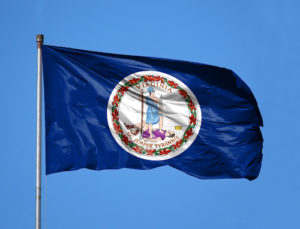 Virginia: The legal battle between two Lynchburg City Council candidates may be over soon. Ward IV Republican candidate Peter Alexander filed a nonsuit motion, hoping to dismiss his lawsuit against incumbent Vice Mayor Chris Faraldi. Alexander said he filed the nonsuit on, August 2. He said it would end the June suit he filed against Faraldi, challenging the primary election results. In this initial suit, Alexander alleged that 125 absentee ballots weren’t counted in the race. Now, the nonsuit reads “Based on such investigation, it has become apparent that all 125 absentee ballots at issue were, in fact, counted (with one possible exception).” Faraldi’s attorney, Zachary Werrell, said that the 125 absentee ballots had a status of ‘marked,’ which Alexander believed meant they were uncounted. Werrell told ABC13 that he thinks this suit is just a symptom of the communication issues on Lynchburg City Council.
Virginia: The legal battle between two Lynchburg City Council candidates may be over soon. Ward IV Republican candidate Peter Alexander filed a nonsuit motion, hoping to dismiss his lawsuit against incumbent Vice Mayor Chris Faraldi. Alexander said he filed the nonsuit on, August 2. He said it would end the June suit he filed against Faraldi, challenging the primary election results. In this initial suit, Alexander alleged that 125 absentee ballots weren’t counted in the race. Now, the nonsuit reads “Based on such investigation, it has become apparent that all 125 absentee ballots at issue were, in fact, counted (with one possible exception).” Faraldi’s attorney, Zachary Werrell, said that the 125 absentee ballots had a status of ‘marked,’ which Alexander believed meant they were uncounted. Werrell told ABC13 that he thinks this suit is just a symptom of the communication issues on Lynchburg City Council.
 Wisconsin: Dane County Circuit Judge Everett Mitchell refused to put on hold his ruling that allows disabled people in Wisconsin to be emailed absentee ballots at home in November’s presidential election in the closely watched battleground state. Republicans asked the judge to not enforce his ruling while their appeal is pending. But Mitchell rejected their arguments, saying putting his ruling on hold “would inflict significant harm on both the disability rights advocates and the public interest.” It will now be up to the state appeals court to decide whether to pause the ruling that opens up a new way for an unknown number of disabled voters to cast their ballots in swing state Wisconsin before the Nov. 5 election. Mitchell granted a temporary injunction on June 25 that allows clerks to email ballots to voters who self-certify that they can’t read or mark a paper ballot without help. The voters can then cast their ballots electronically at home using devices that help them read and write independently. The voters are still required to then print and mail the ballots back to the clerks or return them in person.
Wisconsin: Dane County Circuit Judge Everett Mitchell refused to put on hold his ruling that allows disabled people in Wisconsin to be emailed absentee ballots at home in November’s presidential election in the closely watched battleground state. Republicans asked the judge to not enforce his ruling while their appeal is pending. But Mitchell rejected their arguments, saying putting his ruling on hold “would inflict significant harm on both the disability rights advocates and the public interest.” It will now be up to the state appeals court to decide whether to pause the ruling that opens up a new way for an unknown number of disabled voters to cast their ballots in swing state Wisconsin before the Nov. 5 election. Mitchell granted a temporary injunction on June 25 that allows clerks to email ballots to voters who self-certify that they can’t read or mark a paper ballot without help. The voters can then cast their ballots electronically at home using devices that help them read and write independently. The voters are still required to then print and mail the ballots back to the clerks or return them in person.
 Wyoming: The Laramie County Republican Party has filed a complaint against the Laramie County Clerk’s office, accusing it of violating Wyoming statute during a voting machine test August 5. Laramie County GOP Chairman Taft Love said this is the first time the county’s Republican Party has ever filed an elections code violation complaint against the county clerk, to his knowledge. In a news release, Love, who is a candidate for the open Senate District 6 seat this year, said that the test operated “in direct violation of state statute.” Love notified Laramie County Clerk Debra Lee at the time that the test was not in compliance with state statute. He said Lee was understanding of his concern and said she would call the company, Electronic Systems and Software (ES&S), to print more ballots and rerun the test. On Tuesday, Love received an email from Lee, stating she had not heard back from the company, and it would be another week before she could get back to him. However, time was running out — Tuesday was the last day to run the test before the primary election. “To protect election integrity, we had to go ahead and file the complaint with the DA’s office, secretary of state, the attorney general (and) the county attorney,” Love said.
Wyoming: The Laramie County Republican Party has filed a complaint against the Laramie County Clerk’s office, accusing it of violating Wyoming statute during a voting machine test August 5. Laramie County GOP Chairman Taft Love said this is the first time the county’s Republican Party has ever filed an elections code violation complaint against the county clerk, to his knowledge. In a news release, Love, who is a candidate for the open Senate District 6 seat this year, said that the test operated “in direct violation of state statute.” Love notified Laramie County Clerk Debra Lee at the time that the test was not in compliance with state statute. He said Lee was understanding of his concern and said she would call the company, Electronic Systems and Software (ES&S), to print more ballots and rerun the test. On Tuesday, Love received an email from Lee, stating she had not heard back from the company, and it would be another week before she could get back to him. However, time was running out — Tuesday was the last day to run the test before the primary election. “To protect election integrity, we had to go ahead and file the complaint with the DA’s office, secretary of state, the attorney general (and) the county attorney,” Love said.
Analysis & Opinions This Week
National Opinions: Poll workers | Ranked choice voting | Voting Rights Act, II, III | Voting rights
Alabama: Voting system
Alaska: Ranked choice voting
Arizona: Poll workers
District of Columbia: Ranked choice voting
Florida: Endorsements | Democracy
Georgia: State board of elections | Democracy
Minnesota: Youth vote
Montana: Secretary of state
New Jersey: Ranked choice voting
Oregon: Ranked choice voting
Pennsylvania: Pre-canvassing
Tennessee: Get out the Vote | 15th Amendment
Utah: Election officials
Virginia: Ex-felon voting rights | Poll workers, II
Wisconsin: Drop boxes
Upcoming Events
Resources to Support Election Worker Resilience: This webinar is to introduce The Elections Group’s Wellness Resilience in a Box resources as well as The Carter Center’s wellness guide Taking Care of Yourself to Serve Others to a broad network of election workers. These materials are intended to provide resources to election officials to support their mental and physical well-being and that of their colleagues and staff. The Elections Group launched their resilience resources in April 2024, while The Carter Center issued a first edition of Taking Care of Yourself to Serve Others in 2022. This second edition includes new resources and tools that have been developed for election administrators since the initial launch. When: Aug. 20, 12pm Eastern. Where: Online
The Primary Solution: A Conversation with Nick Troiano: In his book, “The Primary Solution,” Unite America Executive Director Nick Troiano identifies partisan primaries as one of the main drivers of political polarization and gridlock in the U.S. Because primaries are controlled at the state level, Troiano suggests that reforming the primary process presents a great opportunity to make substantive progress in pursuit of a more democratic and representative form of self-government. Unlike Electoral College reform or national voting rights legislation, ending partisan primaries does not require a constitutional amendment or an act of Congress. In fact, states like Alaska and California have already taken steps to eliminate partisan dominance of the primary process, by instituting reforms like top-two primaries and ranked choice voting. On August 22, 2024, from 2-3 p.m. ET, Campaign Legal Center Senior Vice President Paul Smith will host author and Unite America Executive Director Nick Troiano for a discussion on his book, “The Primary Solution: Rescuing Our Democracy from the Fringes.” When: August 22, 2pm Eastern. Where: Online
Closing the Accessibility Gap: Voting in 2024 and Beyond: On August 28, join the U.S. Election Assistance Commission (EAC) for “Closing the Accessibility Gap: Voting in 2024 and Beyond” in the agency’s hearing room. This event will be held in person and live streamed on EAC’s YouTube Channel. Please only register if planning to attend in person. The EAC will host panels featuring election administrators, EAC staff, and election subject matter experts. They will discuss progress made on serving voters with disabilities and new advances in technology, best practices, and funding opportunities to support accessibility efforts. When: August 28, 4pm Eastern. Where: Online
Election Center Annual Conference: The Election Center National Conference will be convening at the Marriott Renaissance Center. CERA Class Dates: Saturday, Sept 7 – Sunday, Sept 8, 2024. Committee Meetings and Evening Reception: Sunday, Sept 8, 2024. Conference Dates: Monday, Sept 9 – Tuesday, Sept 10, 2024. Optional Tour: Detroit Election Facilities – Wednesday, Sept 11, 2024. We will honor the winners of the Election Center’s acclaimed Professional Practices Papers’ Program on Tuesday, Sept 10. All of the 2024 best practices submissions will be posted on the Election Center website post conference. Help us celebrate the 2024 CERA/CERV graduates at the graduation ceremony and hosted luncheon on Tuesday, Sept 10. The Vendor educational exhibits featuring elections suppliers and manufacturers will be available beginning Sunday and continuing through Tuesday. The room block at the Marriott Renaissance Center will sell out quickly so do not delay in making hotel reservations. Additional information can be found on the registration page. One night deposit required. When: Sept. 7-11. Where Detroit
National Voter Registration Day: National Voter Registration Day is a nonpartisan civic holiday dedicated to celebrating our democracy. Since its kickoff in 2012, the holiday and its team of thousands of Partners have worked to get over 5 million Americans registered to vote in time for their next trip to the ballot box. Celebrated each September, National Voter Registration Day involves dedicated Partners of every stripe from all over the country hitting the streets for a single star-spangled awesome day of coordinated field, digital, and media action focused squarely on growing our shared democracy. When: September 17. Where: Everywhere.
National Voter Education Week: National Voter Education Week (NVEW) is an open-source and nonpartisan campaign to help voters bridge the gap between registering to vote and actually casting a ballot. During this week of interactive education, voters have the opportunity to find their polling location, understand their ballot, make a plan to vote in person or remotely, and inspire others to get involved. NVEW strives to help voters overcome common barriers to become confident voters and ambassadors of voting in their own communities for every election. When: Oct. 7-11. Where: Everywhere.
Vote Early Day: Vote Early Day is a nonpartisan movement of media companies, businesses, nonprofits, election administrators, and creatives working to ensure all Americans have the tools to vote early. Vote Early Day was founded by MTV as a new civic holiday focused on helping every voter know how, where, and when they can vote early. Launched in the midst of a global pandemic, Vote Early Day became a critical resource to ensure no voter had to choose between their health and casting their ballot. In its first celebration, Vote Early Day attracted 134 premier partners and 2,700 general partners from every state in the nation. Over 3,000,000 voters cast their ballots on Vote Early Day alone. When: October 29. Where: In states that allow early voting
Election Hero Day: Election Hero Day recognizes the important work and contributions of poll workers, election administrators, and clerks to ensure efficient and secure elections. Join business leaders, elected officials, nonprofit leaders, and citizens from around the country the day before Election Day to celebrate these heroes of our democracy. When: November 4. Where: Everywhere.
Job Postings This Week
electionlineWeekly publishes election administration job postings each week as a free service to our readers. To have your job listed in the newsletter, please send a copy of the job description, including a web link to mmoretti@electionline.org. Job postings must be received by 5pm on Wednesday in order to appear in the Thursday newsletter. Listings will run for three weeks or till the deadline listed in the posting.
Administrative Assistant, Illinois State Board of Elections– Under the general supervision of the Deputy Director of Human Resources, the Administrative Assistant serves as the primary receptionist for the Springfield Office, greeting and providing information to the public concerning services and operations of the agency; provides direct administrative support to the Administrative Services division. Serves as the primary timekeeper for the agency. Serves as backup to the Facility Services Manager as it relates to processing and distributing incoming mail. Assists with processing invoices into SAP, as needed. Essential Function 1: Serves as a receptionist in the Springfield office of the State Board of Elections providing information to the public concerning services and operations of the Agency; greets and assists callers including government officials, members of the press and the general public. Essential Function 2: Serves as Agency timekeeper; responsible for all aspects of agency timekeeping in both the Springfield and Chicago offices. Duties include, but are not limited to, collecting and entering employee monthly timesheets into Central Time and Attendance System (CTAS); updating timekeeping records, distributing employee monthly time reports; and addressing questions or concerns about time records with employees, Deputy Director of Human Resources, and/or supervisor. Essential Function 3: Assists with processing all incoming mail and deliveries by running security scans, date stamping and compiling for each division for distribution. Receives and assures accuracy of the shipping records and proper storage of office supplies; conducts inspection of goods received. Essential Function 4: Assist the Administrative Division with various projects which includes but not limited to; scanning documents, provides clerical support through means of typing from rough draft letters, memos, reports, and other documents; assists with the divisions audit cycles, on an as needed basis, assists the fiscal team in processing and ensuring timely completion of all SBE invoice and bill processing procedures through the use of specialized computer applications, databases, and programs. Essential Function 5: Responsible for the management of the agencies Webmaster inbox and distributing to the appropriate staff. Exercises judgment in answering general inquiries regarding voter registration, publications, candidate information, filing dates, using judgment in referring the public to the proper source of information. Essential Function 6: Responsible for enforcing the agencies visitor procedures; assigning the appropriate visitor badges to the public and ensuring visitors are signing in and out with the agencies log book. Performs other duties as assigned or required which are reasonably within the scope of duties enumerated above. Salary: Starting Salary: $3,334.00 per month. Deadline: August 19. Application: For the complete job listing and to apply, click here.
Cybersecurity Junior Analyst, Palm Beach County, Florida– The Cybersecurity Junior Analyst is responsible for monitoring the organization’s log aggregation tools and triage suspicious activity or detection alerts generated by the security controls implemented within the Supervisor of Elections Office network environment. Additionally, this position will serve as the first line of defense and response for identified security events in accordance with the Information Security Policy, and cybersecurity procedures. Candidate must be organized and personable with a great attitude, be able to work well in a team environment, calmly respond to identified security incidents, and meet deadlines under pressure. Excellent work ethic, including consistent performance, integrity, reliability, and attendance, is a must. Candidate must be detail-oriented and understand the importance of security and safety for all. Must be available 24/7 365, be able to handle simultaneous projects, be a self-starter, and remain informed on emerging threats and technologies. Application: For the complete job listing and to apply, click here.
Deputy City Clerk, North Las Vegas, Nevada— Under general supervision, performs specialized administrative and technical work related to the operation of the Office of the City Clerk. Prepares, processes and distributes City Council Regular, Special and Redevelopment agendas: publishes, mails, and posts agendas as required by the Open Meeting Law. Maintains agenda mailing list. Maintains invocation log and schedules for the City Council meetings. Prepares correspondence including memos to department directors and letters to applicants, representatives and property owners describing the action taken at the various City meetings. Confirms documentation needed on all contracts approved by the City Council and advises contractors of the requirements. Obtains City signatures as necessary. Follows-up on contract expiration dates and notifies appropriate department staff. Attends bid openings. Prepares and distributes meeting minutes, action reports, and summary minutes of public meetings. Publishes, mails, and posts public hearing notices as required by the Open Meeting Law. Prepares City Council Regular, Special and Redevelopment meeting follow-up letters, memos and final action notices; provides administrative support for City Council, commissions, committees, and boards. Performs all related duties in compliance with Nevada Revised Statutes, Nevada Administrative Code and North Las Vegas Municipal Code. Responds to inquiries from the public regarding procedures, activities and other matters that require knowledge of the department’s operations. Ordinance follow-up and log maintenance. Administers agreements which do not need to be approved by City Council. Processes vacations of streets and rights-of-way and annexations; processes bonds, both financial and construction. Responsible for preparing daily, monthly, and annual statistical reporting. Assists in producing election and election related brochures and materials in all necessary languages, including requirements, important dates, methods and means of voting opportunities and necessary documentary evidence required by federal law; acts as filing officer for candidate filing, applications and expense reports. Receives payment from the public in the form of cash, check or money orders; utilizes appropriate cashiering procedures for accepting money, safeguarding the received money and accurately balancing at the end of each day. Performs other related duties as assigned. Salary: $27.01- $42.59/hr Application: For the complete job listing and to apply, click here.
Election Protection Hotline Specialist, Lawyers’ Committee for Civil Rights Under Law– Are you passionate about safeguarding democratic processes? Join us as an Election Protection Hotline Specialist! This pivotal role involves collaborating with hundreds of legal volunteers to address voter concerns reported to the 866-OUR-VOTE hotline. As part of our dynamic hotline infrastructure team, you’ll be at the forefront of managing day-to-day operations. Expect a fast-paced environment, multitasking, and a commitment to early mornings, evenings, and weekends. Embrace the opportunity to learn and employ cutting-edge technology. Responsibilities of the Election Protection Hotline Specialist include but are not limited to: Support the Election Protection contact center, ensuring top-notch assistance to voters using the 866-OUR-VOTE hotline. Organize schedules and workflows for numerous legal volunteers, ensuring exceptional assistance and collecting essential data. Craft volunteer communications such as newsletters and emails, and promptly respond to volunteer inquiries Maintain proper staffing levels based on anticipated call volumes and direct volunteers to necessary resources. Aid volunteers with technical queries related to Twilio, Rocket Chat, Okta, and troubleshoot connectivity and login issues. Collaborate on updating voting rights reference materials and conduct volunteer training. Conduct research to enhance resources addressing caller questions and update volunteer references.Monitor interactions in the Election Protection database to ensure information accuracy and identify trends. Create daily reports summarizing call data to inform Election Protection coalition activities.Identify and engage volunteers for leadership roles and assist in post-election analysis. Application: For the complete job listing and to apply, click here.
Elections Coordinator, Kaufman County, Texas– The Elections Coordinator position plays a pivotal role in our operations, coordinating and supervising the daily operations and overseeing the productivity and quality of the work done by the elections staff. Receive and process applications for ballot by mail and maintain all such records. Assist Elections Administrator in preparation and conduct of county elections and early voting. Required to work compensatory time on election night to report election results to Secretary of State’s Office. Also required to work Saturday and/or Sunday during extended Early Voting hours. Responsible for assisting with the preparation of each election, including ordering ballots and other supplies; preparing electronic poll books; conducting voting schools for all election judges annually; hiring presiding and alternate judges appointed by the Commissioners’ Court. Responsible for providing unofficial election results on election night, reporting to Secretary of State on election night and after canvass, and providing results to IT Department for website posting. Assist the public in person, by telephone, and by mail concerning department information, researching records, filling out forms, and resolving relevant problems. Receive and distribute PPE (Personal Protection Equipment) to judges and clerks. As the Elections Coordinator, you will be responsible for creating and maintaining complex database files for all elections conducted by the department. You will also coordinate and establish the use of the polling locations and the placement of election officials for each election. In addition, you will oversee compensating election officials and customizing and procuring specific procedures, equipment, and materials for them. Your role may also involve handling difficult problems, developing and documenting programs/curriculum, monitoring work unit resources, and ensuring compliance with policies and laws. You will play a key role in the process of Federal, State, and local elections pursuant to the Texas Election Code, which includes tasks such as preparing ballot formats, ordering and furnishing election equipment and supplies, preparing election returns for canvassing, and filing all reports for the Secretary of State. To perform this job successfully, an individual must be able to perform the essential job functions satisfactorily. Reasonable accommodations may be made to enable individuals with disabilities to perform the primary job functions herein described. Since every duty associated with this position may not be described herein, employees may be required to perform duties not explicitly spelled out in the job description, but which may be reasonably considered to be incidental in the performing of their duties just as though they were written out in this job description. Salary: $52,769 – $52,869. Deadline: Aug. 10. Application: For the complete listing and to apply, click here.
Elections Public Records Officer & Project Manager, King County, Washington– The Department of Elections is searching for an energetic and resourceful professional who likes to get stuff done. The Elections Public Records Officer & Project Manager in the Elections Department combines an exciting environment with the opportunity to cultivate talents and apply a variety of skills. The ideal candidate will thrive in an innovative, fast-paced environment and will not hesitate to roll up both sleeves, work hard, have fun, and get the job done. About the position: This position will provide coordination within Elections for ensuring the utmost diligence and attention is paid to coordinating and managing public records requests and gathering of records. This position will also manage and implement various projects within Elections. Salary: $42.94 – $54.43 Hourly. Deadline: Aug. 26. Application: For the complete listing and to apply, click here.
Field Operations Coordinator, Hays County, Texas– Reporting directly to Election Network Engineer, responsible for overseeing the inventory, distribution, maintenance, warehouse storage, and logistics of all equipment, voting ballots, and department assets for Hays County Elections Department. Responsible for identifying and reserving polling sites including overseeing the coordination of all polling site compliance and usage. Ensures polling locations follow the Texas Election Code for early voting and election day. Oversees the day-to-day tasks of the election technicians’ program. Salary: $46,378 – $50,678. Annually Application: For the complete job listing and to apply, click here.
Investigations Specialist (Compliance Specialist 2), Oregon Secretary of State’s Office– We are recruiting for individuals to join our Elections team. In this role, you will help investigate possible violations of Oregon election laws and rules. This is accomplished in part by, but not limited to: Reviewing investigation requests/complaints alleging possible violations of Oregon election laws/rules. Evaluating and determining whether the division should proceed with an investigation. Conducting thorough investigations into possible election law violations. Recommending Division action and outcome of cases. Assessing civil penalties for non-compliance with Oregon election laws/rules. Explaining election laws and rules. Answering the public’s questions about registering to vote and voting. Salary: $5,079- $7,784/month-pers; $5,385 – $8,252/month/non-pers. Application: For the complete job listing and to apply, click here.
IT Assistant Manager, Palm Beach County, Florida– The Assistant IT Manager plays a supportive role in the smooth operation of the IT department, ensuring that both the technical infrastructure and the team are aligned with the organization’s goals. This position involves collaborating closely with the Election Technology Director to oversee the implementation of technology solutions that meet the needs of the organization. The Assistant IT Manager helps maintain an efficient and effective IT environment. Oversee daily operations of the IT department, including help desk operations and performance, troubleshooting issues, and ensuring efficient workflow. Hold department meetings and provide weekly performance summary. Manage IT projects under the direction of the Election Technology Director, ensuring timely completion, budget requirements, and organizational needs. Enforce IT policies and procedures to ensure data security, network access, and system availability. Assist in the management of IT staff by developing skills, coaching, and communicating job expectations. Coordinate vendor renewals, assist with IT budget development, and manage grant applications. Evaluate and assist in maintaining the organization’s disaster recovery and business continuity plans for IT. Assist with IT Public Records requests research and fulfillment. Assist the Election Technology Director in all facets of IT operations. Lead projects and mentor team members. Application: For the complete job listing and to apply, click here.
Manager of the Office of the Mayor and City Council/City Clerk, Moreno Valley, California– Located in the western portion of Riverside County, the beautiful City of Moreno Valley is a small, progressive and welcoming town boasting big city amenities! Solid growth has propelled Moreno Valley to its position as the second-largest city in Riverside County and fourth largest in the Inland Empire. The City is evolving from a bedroom community to one that is successfully attracting new business and fostering well-managed growth to create a superb quality of life for residents and visitors to enjoy. The City of Moreno Valley is a general law city that operates under a Council-Manager form of government. The City Council appoints the City Manager, the City Attorney, and the City Clerk. The new Manager of the Office of the Mayor and City Council/City Clerk will join a thriving executive team which works in tandem to deliver quality services in a transparent and effective manner. As an officer of the City of Moreno Valley and under administrative direction of the Mayor and City Council, the City Clerk exercises direct supervision over an assigned staff of eight(8) full time equivalent positions in accordance with the City’s Personnel Rules and Regulations. The City of Moreno Valley is looking for a well-qualified and compassionate City Clerk who has the ability to maintain the City’s high level of quality customer service. Candidates who are innovative, oriented toward continuous improvement, and committed to collaborating alongside a highly functioning executive team, are desired. The City is looking for strong minded individuals who embrace modern practices and approaches to problem solving and who have experience with the Brown Act, Roberts Rules of Order, parliamentary procedures, and other rules governing the notice and conduct of public hearings. Salary: 131,185.60 – $208,915.20. Deadline: August 23. Application: For the complete job listing and to apply, click here.
Operations Associate, NASED– A part-time (approximately 20 hours per week), fully remote, Operations Associate for a small nonpartisan, nonprofit membership association. Reporting to the Executive Director, this new role will support all the organization’s operational needs. The responsibilities of this position will include, but are not limited to, the following: Help update and maintain website content; Help maintain NASED’s social media presence, including developing content and creating basic graphics; Work with NASED’s controller on monthly financial reports and with the auditor and accountant on annual reports and filings; Monitor and assist with responses to inquiries sent to NASED’s shared inboxes; Maintain organization distribution lists; Assist with scheduling Board and Committee meetings; Assist with conference planning, including developing the conference website via the conference management platform, creating and proofing materials, planning activities, and budgeting; Support the execution of two national conferences per year; Create and send annual invoices to organization members and Corporate Affiliate members; and Other duties and special projects as assigned. This position is part-time and fully remote, but the candidate must live in the United States. Travel to support NASED’s Winter and Summer conferences is required (approximately 10 days per year). This position reports to NASED’s Executive Director. This role does not supervise any staff. Application: For the complete job listing and to apply, click here.
Physical Security Specialist, Palm Beach County, Florida– This position is responsible for administration of the physical security programs in a manner consistent with Supervisor of Elections Office policies, procedures, quality standards, and applicable local, state, and federal regulations. These programs include conducting facility security risk assessments, assisting with access control, monitoring alarms and CCTV systems, and providing security related training. Must be organized and personable with a great attitude, be able to work well in a team environment, and meet deadlines under pressure. Excellent work ethic, including consistent performance, integrity, reliability, and attendance, is a must. Candidate must be detail-oriented and understand the importance of security and safety for all. Must be available 24/7 365, be able to handle simultaneous projects, and be a self-starter. Application: For the complete job listing and to apply, click here.
Senior Regional Engagements Specialist (Remote), EI-ISAC– CIS is in search of a proven, capable, confident, competent, and dynamic self-starter who is passionate about working collaboratively to achieve meaningful and lasting impacts on the security maturity of State, Local, Tribal and Territorial (SLTT) government agencies and entities, including public sector education. This position is within the Elections Infrastructure Information Sharing and Analysis Center (EI-ISAC), a division of CIS. The ideal candidate will be comfortable building and supporting relationships within an assigned region of the United States; interfacing with State Chief Information Officers (CIOs), State Chief Information Security Officers (CISOs), executive level staff, as well as technical staff and US DHS Cybersecurity and Infrastructure Security Agency (CISA) partners. This position will provide exceptional service to SLTTs while expertly informing on the solutions and services that can protect their technology. The Center for Internet Security (CIS) makes the connected world a safer place for people, businesses, and governments through our core competencies of collaboration and innovation. We are a community-driven nonprofit responsible for industry leading best practices for securing IT systems and data. We lead a global community of IT professionals to continuously evolve these standards and provide products and services to proactively safeguard against emerging threats. Salary Range: $69,100 – $104,600. Application: For the complete job listing and to apply, click here.
Registration & Elections Manager, DeKalb County, Georgia– The following duties are normal for this position. The omission of specific statements of the duties does not exclude them from the classification if the work is similar, related, or a logical assignment for this classification. Other duties may be required and assigned. Manages, directs, and evaluates assigned staff; develops and oversees employee work schedules to ensure adequate coverage and control; compiles and reviews timesheets; approves/processes employee concerns and problems and counsels or disciplines as appropriate; assists with or completes employee performance appraisals; directs work; acts as a liaison between employees and management; and trains staff in operations, policies, and procedures. Organizes, prioritizes, and assigns work; prioritizes and schedules work activities in order to meet objectives; ensures that subordinates have the proper resources needed to complete the assigned work; monitors status of work in progress and inspects completed work; consults with assigned staff to assist with complex/problem situations and provide technical expertise; provides progress and activity reports to ; and assists with the revision of procedure manuals as appropriate. Conducts elections; manages personnel to ensure that all elections are conducted in accordance with state and federal laws and regulations; secures early voting locations and recommends schedules; appoints site managers and determines staffing requirements for early and election day voting; works with polling location personnel and county information technology and GIS staff to ensure provision of technology training and services; develops and reviews training for compliance with election laws; monitors early voting traffic; recommends changes in procedures to resolve issues; conducts election night precinct check-in, election audit and preparation of precinct statistics; monitors election tasks lists; monitors election software programming; and oversees financial filing process. Implements, monitors and maintains registration functions and processes; reviews registration functions and processes including felon registrations, duplicate voters, citizenship verifications, jury summons questionnaires, provisional voting, election night precinct check-in and election audit; monitors and ensures compliance with established protocols and procedures; and updates protocols and procedures as needed. Prepares and completes a variety of registration, production and election reports; compiles and/or tracks various administrative and/or statistical data; generates and prepares data; submits all mandated reports to local, state and federal regulatory agencies or others as required; and maintains related records. Maintains training and procedure manuals; and develops, updates, and revises procedural manuals for voter registration and election functions. Interprets, applies, and ensures compliance with all applicable codes, laws, rules, regulations, standards, policies and procedures; initiates any actions necessary to correct deviations or violations; maintains comprehensive, current knowledge of applicable laws/regulations and pending legislation that may impact department operations; and maintains an awareness of new products, methods, trends and advances in the profession. Assists in developing and implementing department budget; reviews budgetary needs and makes recommendations to executive management; and monitors expenditures against approved budget. Salary: $68,778 – $110,732 Application: For the complete job listing and to apply, click here.
Marketplace
electionline provides no guarantees as to the quality of the items being sold and the accuracy of the information provided about the sale items in the Marketplace. Ads are provided directly by sellers and are not verified by electionline. If you have an ad for Marketplace, please email it to: mmoretti@electionline.org